Durham Public Schools

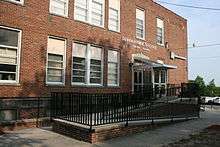
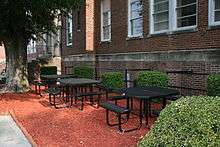
Durham Public Schools was formed in 1992 with the merger of Durham's previous two school districts and is currently the 8th largest school system in North Carolina. There are currently 46 public schools in the system, consisting of 28 elementary (K-5), 8 middle (6-8), 2 secondary (6-12), 7 high (9-12), and 1 hospital school. Durham's schools are traditionally named after notable members of the local community (such as George Watts or Rogers-Herr) or the area they are built in (such as Bethesda or Eno Valley).
Formation
In 1927, Hope Valley School was built for grades 1 through 11. It was the first public school in Southwestern Durham. Changes to the Hope Valley School facility were made in 1941 and 1952. the school was subsequently downgraded to an elementary school with the opening of Southern High School in the fall of 1956. In 1964, Jordan High School on Garrett Road was constructed.
Integration history
Prior to integration, it was commonly thought that the most prominent people attended the Durham City School System: white students attended Durham High School and black students attended Hillside High School.
In 1956, Dr. Martin Luther King, Jr. spoke at Hillside High School, which was one of the Southeast's highest-ranked black high schools.
In 1957, the parents of Joycelyn McKissick and Elaine Richardson sued for their daughters to be reassigned to Durham High School of the Durham City School System.
In 1958, Rencher N. Harris became the first black member of Durham City Board of Education.
In 1959, the Durham City School Board allowed reassignment of eight black pupils to previously all-white schools. The first black students to integrate were Anita Brame and Lucy Jones at Brogden Junior High (now Brogden Middle School). In 1959, Joycelyn McKissick became the first African American student at Durham High School.
In September 1963, Charmaine McKissick among eight other minority youths were the first to desegregate into the Durham Public School system at the Elementary level. Along with her Floyd McKissick Jr, they entered into the North Durham Elementary School. Charmaine McKissick was the youngest to participate in the desegregation. She recalls, “My family prepared us all, every day, with the armor to return the next.[1] “ Not many students are willing to talk about their experiences. McKissick-Melton also states, “It is too painful.”[2] She goes onto write, “There are a few exceptions such as my good friend Janice Guess, whom I encouraged to write her story, and she did in, ‘Little Black Girls Want Pearls Too.’”[3] The integration was a harsh burden for a lot of those children and families involved. McKissick also writes, “The hurt is so deep from the wounds of more than fifty years ago that they still feel the pain.” [4] McKissick-Melton also write, “We had some difficult times but nothing compared to the older students, including my sisters before me. I had it easier because the kids had not had enough time to learn and display their hatred, racist and their bigoted behavior.”[5] Charmaine McKissick-Melton, PH. D, has since then decided to give back to the Durham Community as an Associate Professor in the Department of Mass Communication at North Carolina Central University. She is also the daughter of the late Evelyn and Floyd McKissick, Jude Floyd B. McKissick, Sr.
In 1968, The National Association for the Advancement of Colored People (NAACP) sued the Durham County School System in order to integrate its schools. The Durham County School Board's integration plan was accepted by the Federal District Court in Greensboro. The plan stated that all high schools and junior high schools would be integrated in the fall of 1969. The Federal District Judge gave an extra year for elementary schools due to space limitations and the need to purchase mobile units.
Durham County School System's principals had all been hired during legal segregation, so there was much discussion in the community about how successful integration would be in Durham County. One problem that existed was at Southern High School whose principal was Sidney Ray. Southern High School's mascot was the Rebel, and the high school used the confederate flag. The mascot was later changed to the Spartan. There was less concern about Jordan High School because it had been attended by more affluent families of all colors.
In 1969, the U.S. Supreme Court in Alexander vs. Holmes County Board of Education reversed the decision of the Fifth Circuit Court of Appeals, ruling that continued operation of segregated schools in Mississippi was no longer permissible. The NAACP filed suit in the Court of Appeals in Richmond saying, based on Alexander-Holmes Decision, they wanted all of Durham's elementary schools integrated. The Fourth Circuit Court of Appeals agreed to hear the case in December. The judge stated that Durham County and City Schools had been given 15 years to accomplish integration and had failed. The Fourth Circuit Court of Appeals ruled integration would happen immediately.
In the fall of 1969, all three high schools (Southern, and C.E. Jordan, and Northern) and junior high schools were integrated as ordered. Durham City Schools' high schools were Durham High School and Hillside High School, which were at this time were still the largest public schools in both the city and county of Durham.
In 1970, Durham County elementary schools were fully integrated. Durham City schools began to decline after integration. Middle- and upper-class began emigrating out of the Durham City School System to the Durham County School System. The Durham City School System became populated with poorer people. Hillside High School, almost entirely black, maintained a good number of middle-class blacks. Due to immense migration, blacks began to control the Durham City School System and elected a majority black school board and a black superintendent.
A merger attempt of the Durham City School System and the Durham County School System was made in 1972. There were several more attempt that failed to gain support. Finally, in 1992 an agreement was reached. During the merger, the Durham County School System's junior high (grades 7, 8 & 9) and senior high (10, 11, & 12) format was abolished and the Durham City School System's format of middle schools (grades 6, 7 and 8) and high schools (grades 9, 10, 11 and 12) was implemented.
In 1992, the Durham County School System and the Durham City School System merged to form Durham Public Schools.
2014-2015 (SY) Board of Education
Board members are:[6]
- The chair is Heidi Carter (Consolidated District B). Term expires June 30, 2016.
- The vice chair is Minni Forte-Brown (Consolidated District A). Term expires June 30, 2016.
- Natalie Beyer (District 4) Term expires
- Leigh Bordley (At Large) Term expires June 30, 2016
- Sendolo Diaminah
- Mike Lee
- Matt Sears
2013-2014 (SY) Board of Education
Board members are:[7]
- The chair is Heidi Carter (Consolidated District B). Term expires June 30, 2016.
- The vice chair is Minni Forte-Brown (Consolidated District B). Term expires June 30, 2016.
- Natalie Beyer (District 4) Term expires June 30, 2014
- Leigh Bordley (At Large) Term expires June 30, 2016
- Nancy Cox (District 3) Term expires June 30, 2014
- Fredrick A. Davis (District 2) Term expires June 30, 2014
- Omega Curtis Parker (District 1) Term expires June 30, 2014
2010-2012 Board of Education
The chairman is Minnie Forte-Brown (District A). The vice chairman is Heidi Carter(District B). Board members are:[8]
- Leigh Bordley (At Large)
- Omega Curtis Parker (District 1)
- Fredrick A. Davis (District 2)
- Nancy Cox (District 3)
- Natalie Beyer (District 4)
Superintendents
- 1992
- Kenneth Brunson
- 1992-1993
- C. Owen Phillips
- 1994-1996
- Theodore R. Drain
- 1997-2006
- Dr. Ann T. Denlinger
- 2006-2009
- Dr. Carl E. Harris
- January - June 2010
- H. Hank Hurd (as Interim Superintendent)
- July 1, 2010 - December 31, 2013
- Dr. Eric J. Becoats
- January 1, 2014 - July 11, 2014
- Hugh Osteen (as Interim Superintendent)
- July 14, 2014 – Present
- Dr. Bert L’Homme [9]
Statistics
Durham Public Schools employs 4,600 people (2,300 of them teachers) and had 32,551 students as of the 20th day of school in 2009.[10]
- Pre-Kindergarten: 426
- Grades K-5: 15,394
- Grades 6-8: 6,785
- Grades 9-12: 9,946
Teacher salaries range from $29,750 to $65,440.
The school system utilizes more than 300 school buses to transport over 16,000 students throughout Durham every day.
Demographics
As of the 2010-2011 school year there were 32,566 students enrolled in Durham Public Schools.[11]
| 2003-04 | 2007-08 | 2008-09 | 2009-10 | 2010-11 | |
|---|---|---|---|---|---|
| Black | 56.53% | 53.86% | na | 52.52% | 52.12% |
| White | 29.2% | 22.60% | na | 21.36% | 21.13% |
| Hispanic | 8.9% | 17.11% | na | 19.22% | 20.97% |
| Asian | 2.4% | 2.60% | na | 2.62% | 2.44% |
| American Indian | 0.3% | 0.21% | na | 0.22% | 0.29% |
| Multi-racial | 2.9% | 3.60% | na | 4.06% | 3.05% |
| TOTAL | 30889 | 32749 | 32499 | 32551 | 32566 |
Schools
High Schools (9-12)
Hillside

Hillside High School is a four-year public high school. Of more than 300 historically black high schools that once operated in the state before desegregation, only five remain today, with Hillside being the oldest. Hillside is accredited by the Southern Association of Schools & Colleges. The school mascot is the hornet. Hillside is known for performing arts such as their award-winning Marching Band and Drama Department. Hillside students come from many middle school areas such as Rogers-Herr, Githens, Lowes Grove, Shepard, DSA, Brogden, and Lakewood
Jordan
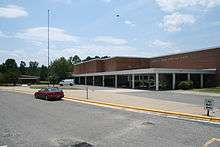
Charles E. Jordan High School is located on Garrett Road near Hope Valley Road in southwest Durham. The school mascot is the falcon. Jordan students come from many area middle schools such as Shepard, Githens, Lowe's Grove, and Rogers-Herr.
Northern
Northern High School is a four-year public high school located in the northern part of Durham. Northern's current principal is Matthew Hunt. Approximately 1633 students are currently enrolled at Northern. Northern is one of Durham's seven public high schools. Students take 4 classes each day. Northern's mascot is a knight. Northern students come from some middle school such as Lucas, Brogden, and Carrington.
Riverside
Riverside High School is a four-year public high school located in Northern Durham. The current principal is Joel County. Opened in 1991, the school currently has approximately 1935 students and is one of seven public high schools in the Durham Public School System. Riverside students come from some middle school areas such as Carrington, Brogden, and Lucas
Southern
Southern High School is a four-year public high school located in southern Durham. Southern is a 4A school, and has football, baseball, and basketball programs as well as the Symphonic Soul of the South Marching Band. There are currently 1105 students.[13] Southern students mostly come from Neal and Brogden or DSA.
Middle College
Middle College High School is located on the campus of Durham Tech. This high school is only for juniors and seniors. There are currently 120 students.
Other High Schools
Middle Schools (6-8)
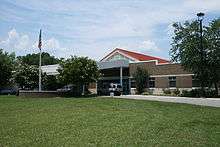
| Name | Principal | Mascot | Colors | Enrollment |
|---|---|---|---|---|
| Brogden | Latonya Smith | Dragon | Green, White | 844 |
| Carrington | Holly Emmanuel | Cougar | Orange, Black | 1300 |
| **See Secondary Schools** | School for Creative Studies (formerly Chewning) | |||
| Githens | Tonya Williams | Raider | Blue, Black, White | 1025 |
| Lowe's Grove | Dr. Tekeisha Mitchell | Viking | Maroon, Gold | 694 |
| Lucas | Michael Somers | Leopard | ||
| Neal | Michael Fuga | Eagle | Green, Gold, White | 840 |
| Rogers-Herr | Kecia Rogers | Ram | Blue, White | 634 |
| James E Shepard IB Middle | Micah Copeland | Panther | Red, Black, White | 439 |
| W.G. Pearson Middle Magnet | Eunice Sanders, Interim | Mighty Lion | Black, Gold | 350 |
| Lakewood Montessori Middle School | Dr. Warnele Carmon | Lynx | Green, White | 300 in 2012-2013 |
Elementary Schools (K-5)
| Name | Principal | Mascot | Enrollment |
|---|---|---|---|
| Bethesda | Shaneeka Moore-Lawrence | Bulldog | 634 |
| Burton Magnet | Takeisha Mitchell | Ram | 325 |
| C. C. Spaulding | Dr. Jamie Carr | Bald eagle | 254 |
| Club Boulevard Humanities Magnet | Terry Phillips | Manatee | 504 |
| Creekside | Cynthia Daniels | Eagle | 865 |
| Easley Year-Round | Mrs. Houzer | Eagle | 642 |
| Eastway | Shayla Holeman | Eagle | 567 |
| E. K. Powe | Michael D. Somers | Eagle | 421 |
| Eno Valley | Willa Johnson-Wall | Eagle | 638 |
| Fayetteville Street | Arrica Dubose-Mosley | Lion | 262 |
| Forest View | Neil Clay | Falcon | 618 |
| George Watts Montessori Magnet School | Patti Crum | Wild Cats | 398 |
| Glenn | Cornelius Redfearn | Lion Pride | 700 |
| Hillandale | Sandra Bates | Hurricane | 627 |
| Holt Year-Round | Star Sampson | Eagle | 613 |
| Hope Valley | Micah Copeland | Eagle | 705 |
| Lakewood Elementary | La’Kesha Roberts | Bulldog | 423 |
| Little River | Cory Hogans | Beaver | 668 |
| Mangum | Janice King | 505 | |
| Merrick-Moore | Kia Eason | Tiger | 679 |
| Morehead Montessori School | Dr. Warnele Renee Carmon | Meerkat | 238 |
| Oak Grove | Aisha Howard | Cougar | 556 |
| Parkwood | Michelle Bell | Panther | 604 |
| Pearsontown | Rodriguez Teal | Panda | 900 |
| R. N. Harris Magnet | Carolyn Pugh | Eagle | 401 |
| Southwest | Nicholas Rotosky | Seahawks | 695 |
| Spring Valley | Barbara R. Parker | Stinger the Bee | 640 |
| W.G Pearson Elementary | LaManda Pryor | Tiger | 621 |
| Y. E. Smith | Letisha N. Judd | Tiger | 347 |
| Sandy Ridge Visual and Performing Arts | Keri Pitchford | 634 | |
Secondary Schools
Durham School of the Arts
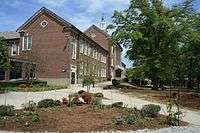
Durham School of the Arts (DSA) is a secondary (grades 6-12) magnet school located in downtown Durham, housing 1431 students.[14] Its focus is on visual and performing arts. Offerings include extensive 3D and 2D art, dance, guitar, strings, band, photography, piano, acting, technical theater, and computer classes. Students are enrolled by a lottery system and can enroll as early as the sixth grade.
Lakeview School
Lakeview School is an alternative school for grades 6-12 to teach those who have a history of misbehavior.
Hospital School
- The Hospital School[15] is located at Duke University Medical Center.
School for Creative Studies
The School for Creative Studies [16] is a year-round secondary magnet school (grades 6-12) located at 5001 Red Mill Road, Durham, 27704. This school opened with 300 students (Grades 6, 7, 9) on July 1, 2013 in the same building that used to house Chewning Middle School. The principal is Renee Price Trapp.
References
- ↑ McKissick-Melton, Charmaine. "Charmaine McKissick-Melton: Pain of First Students to Desegregate Durham Schools Endures." Newsobserver. News and Observer, 28 Oct. 2014. Web. 19 Nov. 2015.
- ↑ McKissick-Melton, Charmaine. "Charmaine McKissick-Melton: Pain of First Students to Desegregate Durham Schools Endures." Newsobserver. News and Observer, 28 Oct. 2014. Web. 19 Nov. 2015.
- ↑ McKissick-Melton, Charmaine. "Charmaine McKissick-Melton: Pain of First Students to Desegregate Durham Schools Endures." Newsobserver. News and Observer, 28 Oct. 2014. Web. 19 Nov. 2015.
- ↑ McKissick-Melton, Charmaine. "Charmaine McKissick-Melton: Pain of First Students to Desegregate Durham Schools Endures." Newsobserver. News and Observer, 28 Oct. 2014. Web. 19 Nov. 2015.
- ↑ McKissick-Melton, Charmaine. "Charmaine McKissick-Melton: Pain of First Students to Desegregate Durham Schools Endures." Newsobserver. News and Observer, 28 Oct. 2014. Web. 19 Nov. 2015.
- ↑ http://www.dpsnc.net/pages/Durham_Public_Schools/District/Board_of_Education/About_the_Board_of_Education
- ↑ Board of Education page, Durham Public Schools, retrieved 2014-05-22
- ↑ Board of Education page, Durham Public Schools, retrieved 2010-05-15
- ↑ http://www.dpsnc.net/pages/Durham_Public_Schools/News/Durham_Public_Schools_board_na
- ↑ DPS "Quick Facts"
- ↑ http://www.dpsnc.net/images/pdf/enrollment/ADM_2010.11.pdf
- ↑ http://www.dpsnc.net/about-dps/district-stats-and-scores/district-data/demographics-enrollment-data
- ↑ Southern High School profile, Durham Public Schools, retrieved 2010-05-15
- ↑ DSA school report, NC Public Schools, retrieved 2010-05-15
- ↑ Hospital School profile, Durham Public Schools, retrieved 2010-05-15
- ↑ The School for Creative Studies profile, Durham Public Schools, retrieved 2013-12-31
External links
| Wikimedia Commons has media related to Durham Public Schools. |
- Durham Public Schools Official website
- Oral History Interviews with Josephine Dobbs Clement , from Oral Histories of the American South